
Mails sent to Dartmouth -Daily at 6 a.m., 1 30p.m., 7 p.m. – Postage 3 cents per half ounce.
British Colonist, May 3, 1873. Page 3, Colum 3-5. https://news.google.com/newspapers?nid=HDshCWvjkbEC&dat=18730503&printsec=frontpage&hl=en
Amicitia Crescimus

Mails sent to Dartmouth -Daily at 6 a.m., 1 30p.m., 7 p.m. – Postage 3 cents per half ounce.
British Colonist, May 3, 1873. Page 3, Colum 3-5. https://news.google.com/newspapers?nid=HDshCWvjkbEC&dat=18730503&printsec=frontpage&hl=en
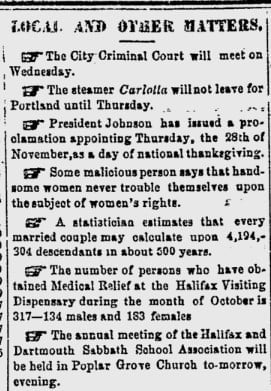
Some malicious person says that handsome women never trouble themselves upon the subject of women’s rights.
…
The annual meeting of the Halifax and Dartmouth Sabbath School Association will be held in Poplar Grove Church tomorrow evening.
Halifax Morning Chronicle, Nov 4, 1867. Page 2 Column 5. https://news.google.com/newspapers?nid=39&dat=18671104&id=jZUHAAAAIBAJ&sjid=pzoDAAAAIBAJ&pg=2801,4425561
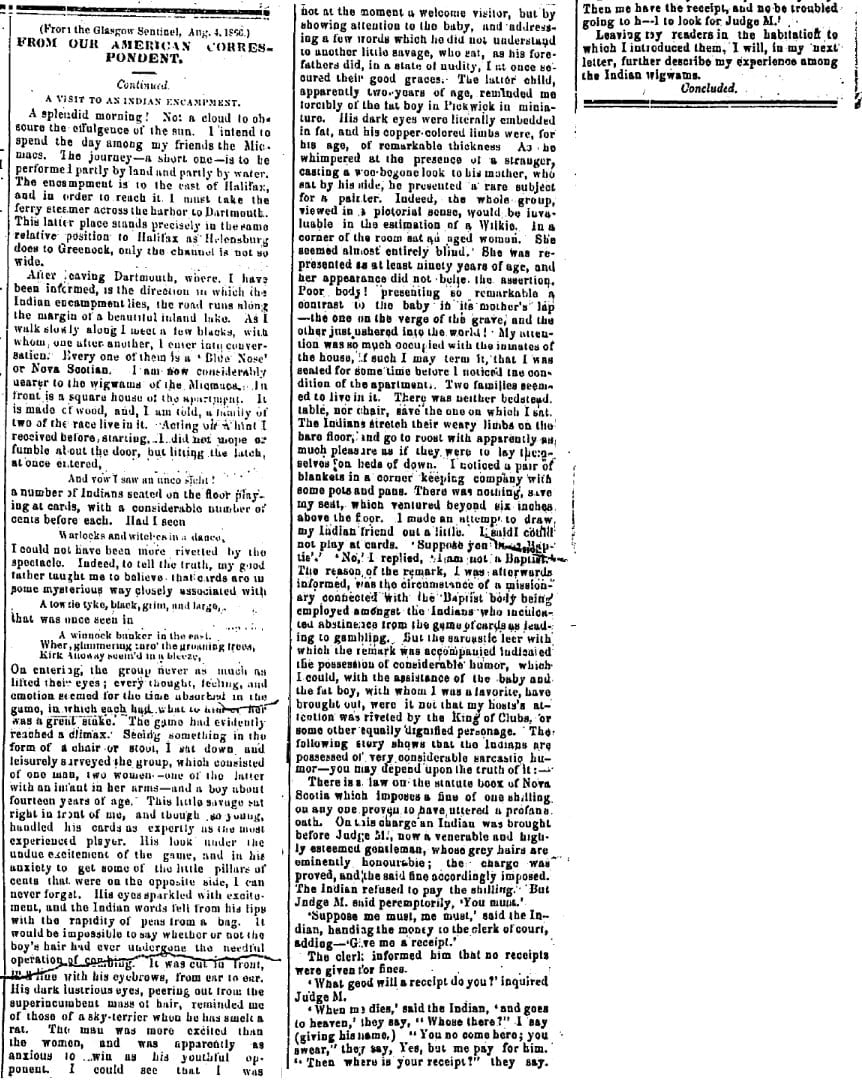
(From the Glasgow Sentinel, Aug 4, 1866.) From our American Correspondent.
A splendid morning! Not a cloud to obscure the effulgence of the sun. I intended to spend the day among my friends the [Mi’kmaq]. The journey – a short one – is to be performed partly by land and partly by water. The encampment is to the east of Halifax, and in order to reach it I must take the ferry steamer across the harbor to Dartmouth. This latter place stands precisely in the same relative position to Halifax as Helensburg does to Greenock, only the channel is not so wide.
After leaving Dartmouth, where I have been informed, is the direction in which the [Mi’kmaq] encampment lies, the road runs along the margin of a beautiful inland lake. As I walk slowly along I meet a few blacks, with whom, one after another, I enter into conversation. Every one of them is a ‘Blue Nose’ or Nova Scotian. I am now considerably nearer to the wigwams of the [Mi’kmaq]. In front is a square house of the apartment. It is made of wood, and, I am told, a family of two of the race live in it Acting on a hint I received before, starting I did not mope or fumble about the door, but lifting the hatch, at once entered
And vow I saw an [uncommon sight?]
a number of [Mi’kmaq] seated on the floor playing cards, with a considerable number of cents before each. Had I seen
Warlocks and witches in a dance
I could not have been more riveted by the spectacle. Indeed, to tell the truth, my good father taught me to believe that cards are in some mysterious way closely associated with
A (?) tyke, black, grim, and large
that was once seen in
A winnock bunker in the east.
Wher, glimmering thro’ the groaning trees
Kirk Attoway seem’d in a breeze,
On entering, the group never as much lifted their eyes; every thought, feeling, and emotion for the time seemed absorbed in the game, in which each had what to him or her was a great stake. The game had evidently reached a climax. Seeing something in the form of a chair or stool, I sat down and leisurely surveyed the group, which consisted of one man, two women – one of the latter with an infant in her arms – and a boy about fourteen years of age. This little [Mi’kmaq] sat right in front of me, and though so young, handled his cards as expertly as the most experienced player. His look under the undue excitement of the game, and in his anxiety to get some of the little pillars of cents that were on the opposite side, I can never forget. His eyes sparkled with excitement, and the [Mi’kmaq] words fell from his lips with the rapidity of peas from a bag. It would be impossible to say whether or not the boy’s hair had ever undergone the needful operation of combing. It was cut in front, in a line with his eyebrows, from ear to ear. His dark lustrous eyes, peering out from the superincumbent mass of hair, reminded me of those of a sky-terrier when he has smelt a rat. The man was more excited than the women, and was apparently as anxious to win as his youthful opponent. I could see that I was not at the moment a welcome visitor, but by showing attention to the baby, and addressing a few words which he did not understand to another little [Mi’kmaq], who sat, as his forefathers did, in a state of nudity, I at once secured their good graces. The latter child, apparently two years of age, reminded me forcibly of the fat boy in Pickwick in miniature. His dark eyes were literally embedded in fat, and his copper colored limbs were, for his age, of remarkable thickness. As he whimpered at the presence of a stranger, casting a woebegone look to his mother, who sat by his side, he presented a rare subject for a painter. Indeed, the whole group viewed in a pictorial sense, would be invaluable in the estimation of a Wilkie. In a corner of the room sat an aged woman. She seemed almost entirely blind. She was represented as at least ninety years of age, and her appearance did not belie the assertion. Poor body! presenting so remarkable a contrast to the baby in its mothers lap -the one on the verge of the grave, and the other just ushered into the world! My attention was so much occupied with the inmates of the house, if such I may term it, that I was seated for some time before I noticed the condition of the apartment. Two families seemed to live in it. There was neither bedstead, table nor chair, save the one on which I sat. The [Mi’kmaq] stretch their weary limbs on the bare floor, and go to roost with apparently as much pleasure as if they were to lay themselves on beds of down. I noticed a pair of blankets in a corner keeping company with some pots and pans. There was nothing, save my seat, which ventured beyond six inches above the floor. I made an attempt to draw my [Mi’kmaq] friend out a little. I said I could not play cards. “Suppose you be a Baptist”. “No”, I replied, I am not a Baptist. The reason of the remark I was afterwards informed, was the circumstance of a missionary connected with the Baptist body being employed amongst the [Mi’kmaq] who inculcated abstinence from the game of cards as leading to gambling. But the sarcastic leer with which the remark was accompanied indicated the possession of considerable humor, which I could, with the assistance of the baby and the fat boy, with whom I was a favorite, have brought out, were it not that my host’s attention was riveted by the King of Clubs or some other equally dignified personage. The following story shows that the [Mi’kmaq] are possessed of very considerable sarcastic humor – you may depend on the truth of it:-
There is a law on the Statute book of Nova Scotia which imposes a fine of one shilling on any one proven to have uttered a profane oath. On this charge a [Mi’kmaq] was brought before Judge M., now a venerable and highly esteemed gentleman, whose grey hairs are eminently honorable; the charge was proved, and the said fine accordingly imposed. The [Mi’kmaq] refused to pay the shilling. But Judge M. said peremptorily, “You must.”
“Suppose me must, me must,” said the [Mi’kmaq], handing the money to the clerk of court, adding -“Give me a receipt.”
The clerk informed him that no receipts were given for fines.
“What good will a receipt do you?” inquired Judge M.
“When me dies,” said the [Mi’kmaq], “and goes to heaven,” they say, “Whose there?” I say giving his name, “You no come here; you swear,” they say, Yes, but me pay for him. “Then where is your receipt?” they say. Then me have the receipt, and no be troubled going to [hell] to look for Judge M.”
Leaving my readers in the habitation to which I introduced them, I will, in my next letter, further describe my experience among the Indian wigwams.
Halifax Citizen, Sep 4, 1866. Page 1, Column 7. https://news.google.com/newspapers?nid=D90uR9ClOh8C&dat=18660904&printsec=frontpage&hl=en
Equally applicable to any epoch, I imagine.
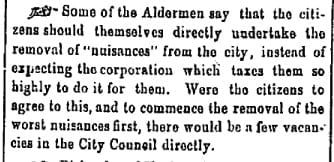
Some of the Aldermen say that the citizens should themselves directly undertake the removal of “nuisances” from the city, instead of expecting the corporation which taxes them so highly to do it for them. Were the citizens to agree to this, and to commence the removal of the worst nuisances first, there would be a few vacancies in the City Council directly.
Halifax Citizen, Jun 1, 1865. Page 3 Column 5. https://news.google.com/newspapers?nid=D90uR9ClOh8C&dat=18650601&printsec=frontpage&hl=en

Capt John Taylor Wood, late of the Confederate States Steamer Tallahassee, is a passenger by the steamer Lark, which arrived from Havana today.
Halifax Citizen, July 1 1865. Page 1, Column 6. https://news.google.com/newspapers?nid=D90uR9ClOh8C&dat=18650701&printsec=frontpage&hl=en
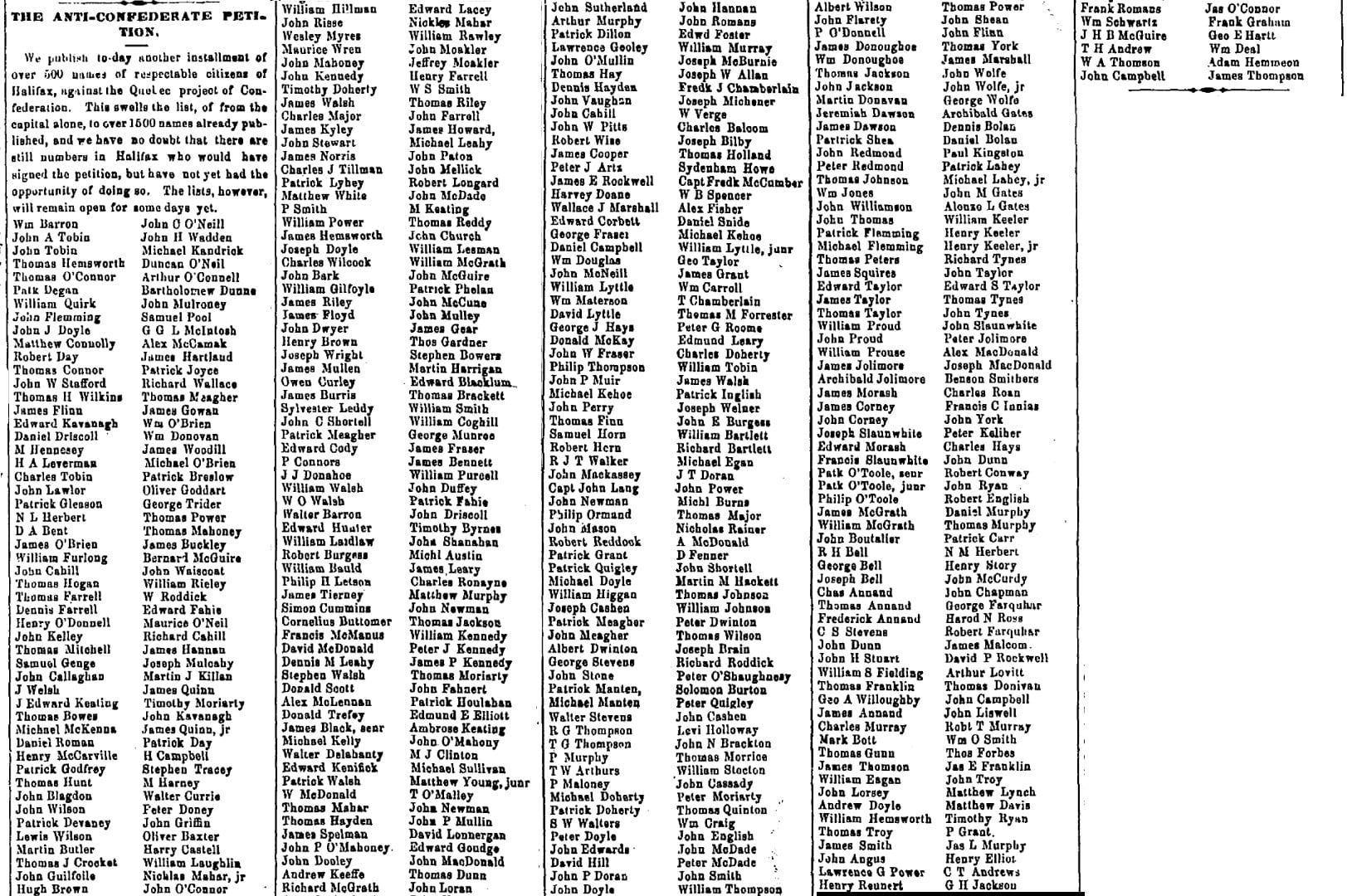
We publish today another installment of over 500 names of respectable citizens of Halifax, against the Quebec project of Confederation. This swells the list, of from the capital alone, to over 1500 names already published, and we have no doubt that there are still numbers in Halifax who would have signed the petition, but have not yet had the opportunity of doing so. The lists, however, will remain open for some days yet.
Halifax Citizen, Aug 2, 1866. Page 2, Column 3. https://news.google.com/newspapers?nid=D90uR9ClOh8C&dat=18660802&printsec=frontpage&hl=en

A man named Thos. Tobin has been arrested and committed for trial in the Criminal Court, on a charge of enticing soldiers to desert.
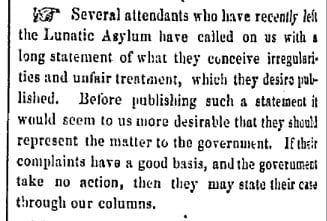
Several attendants who have recently left the Lunatic Asylum have called on us with a long statement of what they conceive irregularities and unfair treatment, which they desire published. Before publishing such a statement it would seem to us more desirable that they should represent the matter to the government. If their complaints have a good basis, and the government take no action, then they may state their case through our columns.
Halifax Morning Sun, Jun 2, 1865. Page 1 Column 6. https://news.google.com/newspapers?nid=D90uR9ClOh8C&dat=18660403&printsec=frontpage&hl=en

Some miscreants have destroyed several of the trees lately planted on the common. The vandals, if discovered, should be promptly and sharply dealt with.
Halifax Sun and Advertiser, Tue May 16, 1865. Page 2 Column 6. https://news.google.com/newspapers?nid=D90uR9ClOh8C&dat=18650516&printsec=frontpage&hl=en
Reminiscent of something more recent:
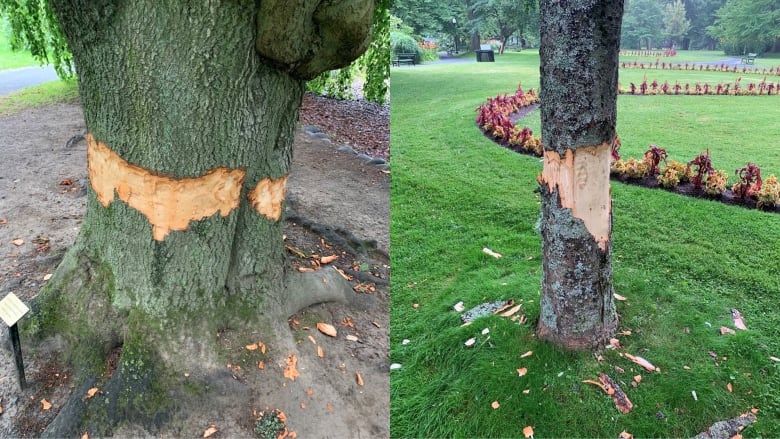
“Police are investigating after bark was stripped off the trunks of roughly 30 trees throughout the Halifax Public Gardens.
In an email, a municipal official said it’s possible the bark was stripped with an axe or a hatchet and the damage varies from tree to tree. Some of the damaged trees are 200 years old, according to a Halifax Regional Police statement released on Wednesday.”
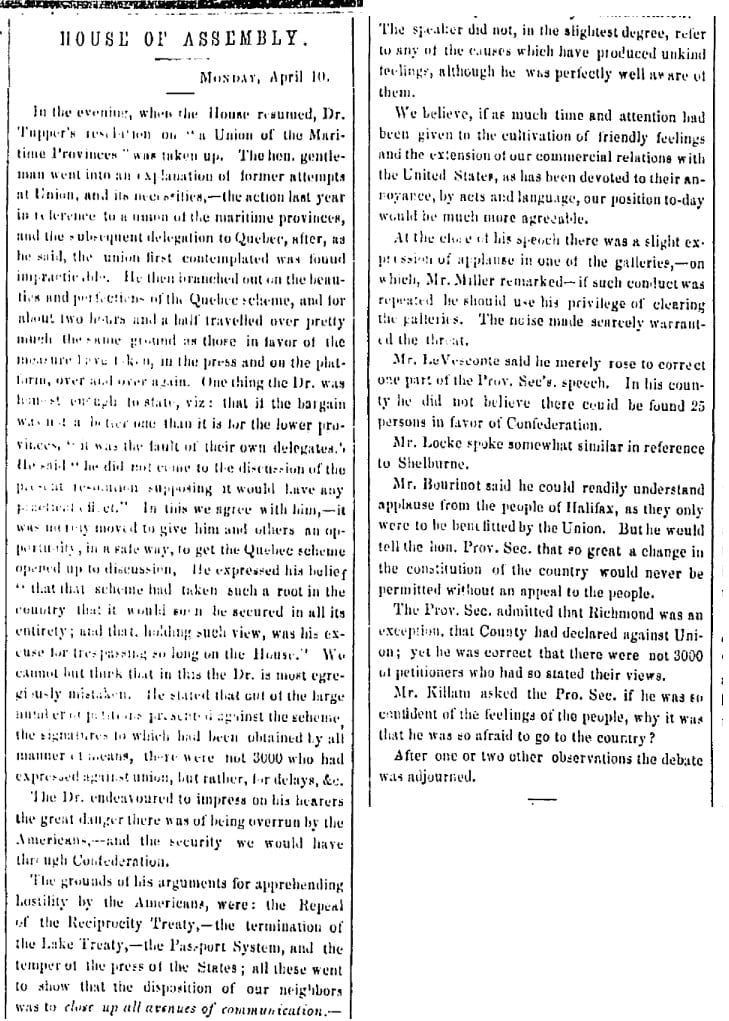
House of Assembly – Monday, April 10.
In the evening, when the house resumed, Dr. Tupper’s resolution on “a Union of the Maritime Provinces” was taken up. The hon. gentleman went into an explanation of former attempts at Union, and its necessities, -the action last year in reference to a union of the maritime provinces, and the subsequent delegation to Quebec, after, as he said, the union first contemplated was found impactable. He then branched out on the beauties and particulars of the Quebec scheme, and for about two hours and a half travelled over pretty much the same ground as those in favor of the measure have taken, in the press and on the platform, over and over again. One thing the Dr. was honest enough to state, viz: that if the bargain was not a better one than it is for the lower provinces, “it was the fault of their own delegates.” He said “he did not come to the discussion of the present question supposing it would have any particular effect.” In this we agree with him, -it was moved to give him and others an opportunity, in a safe way, to get the Quebec scheme opened up to discussion. He expressed his belief “that that scheme had taken such a root in the country that it would soon be secured in all its entirety; and that, holding such view, was his excuse for trespassing so long on the House.” We cannot but think that in this the Dr. is most egregiously mistaken. He stated that out of the large amount of patriots presented against the scheme, the signatures to which had been obtained by all manner of means, there were not 3000 who had expressed against union, but rather for delays, &c.
The Dr. endeavored to impress on his hearers the great danger there was of being overrun by the Americans, -and the security we would have though Confederation.
The grounds of his arguments for apprehending hostilities by the Americans, were: the Repeal of the Reciprocity Treaty, -the termination of the Lake Treaty, -the Passport System, and the temper of the press of the States; all these went to show that the disposition of our neighbors was to close up all avenues of communication. -The speaker did not, in the slightest degree, refer to any of the causes which have produced unkind feelings, although he was perfectly well aware of them.
We believe, if as much time and attention had been given to the cultivation of friendly feelings and the extension of our commercial relations with the United States, as has been devoted to their annoyance, by acts and language, our position today would be much more agreeable.
At the close of his speech there was a slight expression of applause in one of the galleries, -on which, Mr. Miller remarked – if such conduct as repeated he should use his privilege of clearing the galleries. The noise made scarcely warranted the threat.
Mr. LeVesconte said he merely rose to correct one part of the Prov. Sec’s speech. In his county he did not believe there could be found 25 persons in favor of Confederation.
Mr. Locke spoke somewhat similar in reference to Shelburne.
Mr. Bourinot said he could readily understand applause from the people of Halifax, as they only were to be benefitted by the Union. But he would tell the hon. Prov. Sec. that so great a change in the constitution of the country would never be permitted without an appeal to the people.
The Prov. Sec. admitted that Richmond was an exception, that County had declared against Union; yet he was correct that there was not 3000 of petitioners who had stated their views.
Mr. Killam asked the Pro. Sec. if he was so confident of the feelings of the people, why it was that he was so afraid to go to the country?
After one or two other observations the debate was adjourned.
Halifax Morning Sun, April 12, 1865. Page 3 Column 4. https://news.google.com/newspapers?nid=dw5aoL0HVgwC&dat=18650412&printsec=frontpage&hl=en

A Pleasantly situated two-story house, containing ten rooms, with frost proof cellars, having a commanding view of the harbour and city; also in sight and within ten minutes walk of the steamboat wharf. Possession given immediately. Terms and particulars made known on application to W Myers Gray, House and Estate Agent, 139 Hollis street.
Halifax Citizen, April 3, 1865. Page 2 Column 2. https://news.google.com/newspapers?nid=D90uR9ClOh8C&dat=18660403&printsec=frontpage&hl=en